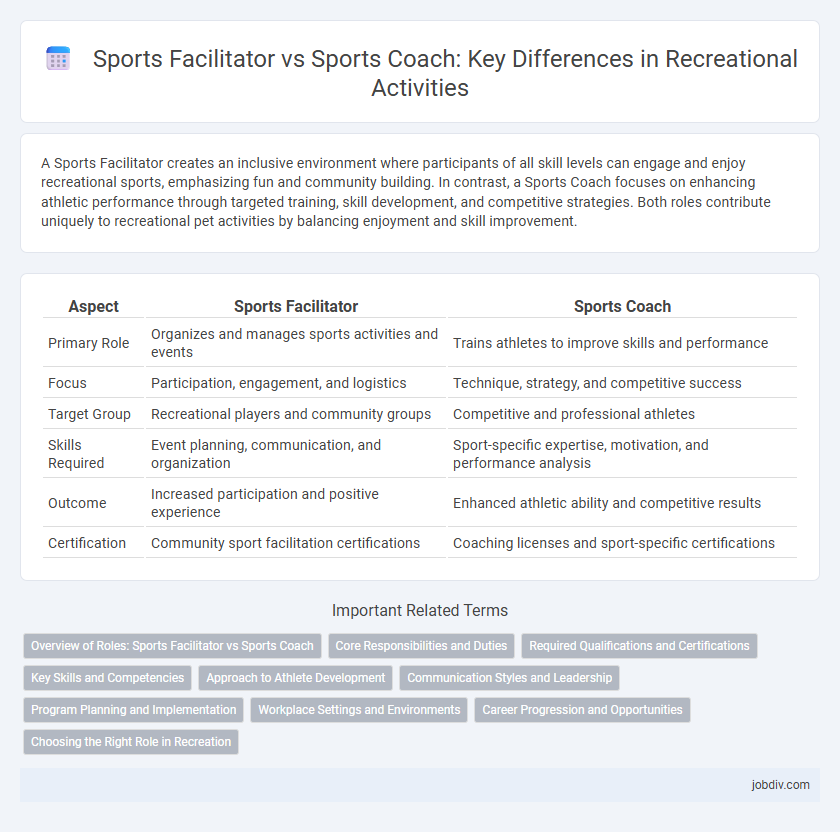A Sports Facilitator creates an inclusive environment where participants of all skill levels can engage and enjoy recreational sports, emphasizing fun and community building. In contrast, a Sports Coach focuses on enhancing athletic performance through targeted training, skill development, and competitive strategies. Both roles contribute uniquely to recreational pet activities by balancing enjoyment and skill improvement.
Table of Comparison
| Aspect | Sports Facilitator | Sports Coach |
|---|---|---|
| Primary Role | Organizes and manages sports activities and events | Trains athletes to improve skills and performance |
| Focus | Participation, engagement, and logistics | Technique, strategy, and competitive success |
| Target Group | Recreational players and community groups | Competitive and professional athletes |
| Skills Required | Event planning, communication, and organization | Sport-specific expertise, motivation, and performance analysis |
| Outcome | Increased participation and positive experience | Enhanced athletic ability and competitive results |
| Certification | Community sport facilitation certifications | Coaching licenses and sport-specific certifications |
Overview of Roles: Sports Facilitator vs Sports Coach
Sports facilitators organize and manage recreational sports programs, ensuring smooth operations and participant engagement, while sports coaches focus on developing athletes' skills, strategies, and overall performance. Facilitators coordinate logistics, promote inclusivity, and foster community involvement, whereas coaches provide technical instruction, motivation, and performance analysis tailored to individual or team goals. Both roles contribute essential support to sports environments, but facilitators emphasize program management and accessibility, contrasting with coaches' emphasis on athletic development and competition preparation.
Core Responsibilities and Duties
A Sports Facilitator primarily focuses on organizing sports activities, managing logistics, and ensuring a safe, inclusive environment for participants. In contrast, a Sports Coach dedicates their efforts to skill development, training, performance improvement, and strategic guidance for athletes or teams. Both roles are crucial in recreation, with facilitators enabling participation and coaches driving competitive success.
Required Qualifications and Certifications
Sports facilitators typically require certification in sports management or physical education, with emphasis on organizational and supervisory skills. Sports coaches must hold specific coaching licenses accredited by national sports authorities, demonstrating expertise in training techniques, safety protocols, and athlete development. Both roles demand ongoing professional development through workshops and certification renewals to maintain standards in the recreation and sports industry.
Key Skills and Competencies
Sports facilitators excel in organizational skills, event management, and community engagement, ensuring smooth coordination of recreational activities. Sports coaches demonstrate expertise in technical training, performance analysis, and motivational techniques to enhance athletes' skills and competitive outcomes. Both roles require strong communication abilities and a deep understanding of sports principles to foster participant development and engagement.
Approach to Athlete Development
A sports facilitator emphasizes creating an inclusive environment that encourages athletes to explore various activities and develop holistic skills through guided discovery. In contrast, a sports coach focuses on structured training plans tailored to enhancing athletes' specific performance and technical abilities. Both roles prioritize athlete growth but differ in methodology, with facilitators fostering autonomy and coaches driving targeted skill improvement.
Communication Styles and Leadership
Sports facilitators emphasize collaborative communication, encouraging open dialogue and participant feedback to foster inclusive environments. Sports coaches adopt directive communication, delivering clear instructions and structured guidance to optimize athlete performance and skill development. Leadership in facilitation focuses on empowerment and team cohesion, while coaching prioritizes goal-oriented motivation and tactical decision-making.
Program Planning and Implementation
Sports facilitators specialize in program planning, focusing on designing inclusive recreational activities that cater to diverse community needs. Sports coaches concentrate on implementation, developing tailored training sessions to enhance athletes' skills and performance. Both roles collaborate to create structured, goal-oriented sports programs that foster participation and athletic development.
Workplace Settings and Environments
Sports facilitators primarily operate in community centers, recreational facilities, and educational institutions where they organize and manage sports programs aimed at broad participation and engagement. Sports coaches typically work in more specialized environments such as sports clubs, training academies, and competitive teams, focusing on skill development, performance enhancement, and strategic training. Both roles require effective communication and leadership, but facilitators emphasize inclusive programming while coaches concentrate on athlete progression and competitive outcomes.
Career Progression and Opportunities
Sports facilitators focus on coordinating programs, managing logistics, and ensuring smooth operations, which opens career paths in sports management and event planning. Sports coaches specialize in skill development, performance analysis, and athlete motivation, leading to advancement in coaching ranks or professional team positions. Understanding these distinct roles enhances career progression opportunities within the broader recreation and sports industry.
Choosing the Right Role in Recreation
Selecting between a sports facilitator and a sports coach depends on the specific needs of the recreational program and participant goals. A sports facilitator emphasizes organizing activities, ensuring safety, and fostering a fun, inclusive environment, while a sports coach focuses on skill development, technique improvement, and competitive performance. Understanding these distinctions helps recreation managers align roles with desired outcomes, enhancing participant satisfaction and engagement.
Sports Facilitator vs Sports Coach Infographic

 jobdiv.com
jobdiv.com